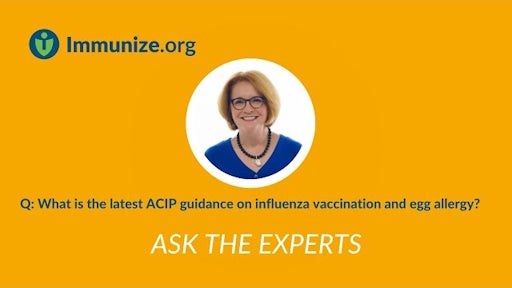- Influenza
- Contraindications & Precautions
What are contraindications and precautions for inactivated (IIV) or recombinant (RIV) influenza vaccines?
Contraindications to egg-based inactivated influenza vaccines (IIV) are a severe allergic reaction to a prior dose of any influenza vaccine (any egg-based IIV, ccIIV, RIV, or LAIV of any valency) or a severe allergy to an influenza vaccine component (except egg). ACIP recommends that people with egg allergy of any severity may receive any influenza vaccine appropriate for their age and health status.
Precautions to egg-based IIV include moderate or severe acute illness, and history of Guillain-Barré syndrome within 6 weeks after a dose of influenza vaccine.
Contraindications to cell culture-based IIV (ccIIV) are a history of a severe allergic reaction to a previous dose of ccIIV or any component of ccIIV.
Precautions to ccIIV are moderate or severe acute illness, a history of Guillain-Barré syndrome within 6 weeks after a dose of any influenza vaccine, and a history of a severe allergic reaction to a previous dose of another type of influenza vaccine (e.g., any egg-based IIV, RIV, or LAIV).
Contraindications to RIV are a history of a severe allergic reaction to a previous dose of RIV or any component of RIV.
Precautions to RIV are moderate or severe acute illness, a history of Guillain-Barré syndrome within 6 weeks after a dose of any influenza vaccine, and a history of a severe allergic reaction to a previous dose of another type of influenza vaccine (e.g., any egg-based IIV, ccIIV, or LAIV).
